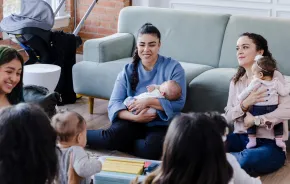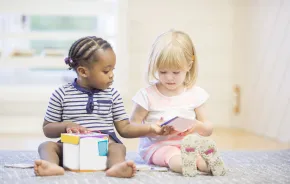 The Melodic Caring Project streams live concerts to hospital rooms, creating a communal experience for children who have been isolated by illness. At a Melodic Caring concert, the kids are the rock stars, and the performers are their no. 1 fans. The nonprofit was founded by singer-songwriter Levi Ware and his wife, Stephanie Ware. Visit melodiccaringproject.org to get involved.
The Melodic Caring Project streams live concerts to hospital rooms, creating a communal experience for children who have been isolated by illness. At a Melodic Caring concert, the kids are the rock stars, and the performers are their no. 1 fans. The nonprofit was founded by singer-songwriter Levi Ware and his wife, Stephanie Ware. Visit melodiccaringproject.org to get involved.
Music is what feeling sounds like. Music is what healing sounds like. It has the power to bring people back to life. I’ve seen it. I’ve experienced it. It is powerful, and beautiful. And I will be forever grateful to the Melodic Caring project for stepping in during some of my darkest days and saying, “We’re here for you, and we love you. You are the RockSTAR.
— Excerpt from a letter written by Alisha, a patient
What inspired Melodic Caring Project?
Levi: A buddy of mine is a middle school teacher. One of his students, an 11-year-old girl named Katie, was diagnosed with leukemia. So we put together a concert for Katie. But she ended up having to be at Seattle Children’s to go through chemo, so she couldn’t be at the show. We thought, there’s got to be a way to get her involved so she knows that we’re all here and we all care. We had a laptop with a video camera on it, and a coffee shop a couple doors down with an open Wi-Fi network, and we thought, let’s just stream it. Afterward, we called her and her mom at the hospital, and they were both bawling, because after so much time alone it was really impactful that they weren’t forgotten.”
Stephanie: We started telling people about what happened, and they just told us, “You have to do this.” The people at the shows know that they are part of something bigger than just the concert that night, that it’s reaching out and really benefiting somebody else in a situation that most people don’t have to think about. It brings out the best in people.
How did the concert for Katie grow into Melodic Caring Project?
Levi: We realized right off that if we’re going to dedicate ourselves to this, then we have to do it right and build a foundation that really supports the ability of this program to reach kids. When we founded our board, we got very well-respected people in every field. We’re tying the music field to the medical field and technology.
Stephanie: At the start, Levi worked construction. He’d get home on Thursday nights, and we would devote every Friday to developing this idea. At the end of 2011, Seattle Children’s wanted to offer concerts to some of their patients, and we decided to jump into it full-time.
So how do you do a concert?
Levi: There are three sides. We have A&R [artists and repertoire professionals] to reach out to musicians to line up artists; we work with the child life divisions of the hospitals to offer the shows to their kids; and we get applications from the kids to be the rock stars. Then we send that show to their hospital rooms.
Stephanie: We handle some of the booking ourselves, but mostly we team up with people like Seattle Living Room Shows. We look into who’s playing and research their songs and how they act on stage. And the thing is, the artists get on stage and know that they are speaking to kids on the other side and —
Levi: They’re profoundly affected by it. We’ve had a lot of artists come up after the shows and say, “This is the most profound experience I’ve ever had with music, because it gave my music purpose.”
How does it work on the kids’ side?
Levi: Typically, the day or two before the actual concert is when most of the kids will sign up. They might be here in Seattle or in Tacoma or Portland, [as far as] the East Coast. When we streamed Switchfoot, fans were watching from around the world. They sent messages on the live chat [like] “We’re watching in Belgium and thinking about you.”
Stephanie: We have a live-chat moderator at the concert. People can tune in wherever they are and offer words of encouragement to the kids. The kids can just watch anonymously or participate in the live chat.
Levi: The kids can invite their friends to be part of the show. So in a situation like with Katie, her friends didn’t know how to support her — rather than rally around her, they [had] kind of dispersed. When we stream the show, she can say, “Hey, watch this show,” and rather than focus on the illness that’s dividing them, now they’re focusing on this rock show. The artists call Katie out and say, “Katie, you’re the rock star. We’re your number one fans,” then all the friends go “Oh my God!” and the communication opens back up.











